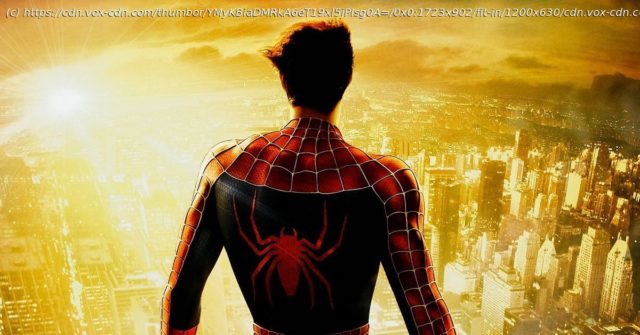Spider-Man is back in theaters in 2024, and it’s a chance to revisit how Army of Darkness director Sam Raimi made Tobey Maguire an icon in the role.
All eight Spider-Man live-action movies are returning to theaters this spring, in a series Sony is calling Spider-Mondays. We’ve updated and reposted this essay on Spider-Man’s best movie arc in conjunction with the re-release.
By the end of Sam Raimi’s 2002 movie Spider-Man, secret superhero Peter Parker (Tobey Maguire) isn’t any better off personally than he was at the beginning of the film, when he was an awkward nerd without superpowers. Peter’s Uncle Ben is dead, and his Aunt May is struggling. His would-be mentor Norman Osborn (Willem Dafoe) became a villain and died while trying to murder Peter, and Norman’s son, Peter’s former best friend, Harry (James Franco), seems prepared to follow in his dad’s footsteps. And Mary Jane Watson (Kirsten Dunst), the love of Peter’s life, has admitted she returns his feelings, but he can’t reciprocate. He walks away, knowing that “with great power comes great responsibility.” If he stays true to his morals, he can’t stop being Spider-Man, and he can’t allow the role to endanger those he cares about.
Cue the ending: a thrilling web-slinging sequence, an American flag consuming half the background in a post-9/11 “We will be strong!” bit of iconography. There’s a smash cut to the credits, then Danny Elfman’s incredible Spider-Man score juxtaposed with “Hero,” the lead single from the soundtrack, shouted by Nickelback’s Chad Kroeger and Saliva’s Josey Scott.
It sounds messy, like a clumsy assortment of 2002 culture closing out the superhero blockbuster that went on to inform all the superhero blockbusters that followed it for the next 20 years. And honestly, it kind of is. The inclusion of catchy tie-in album music coupled with such an obvious cultural nod both date the film and render it a victim of its own franchising. But it’s a testament to the strength of Spider-Man’s character arc that all this noise doesn’t drown out the story sequence of a young man learning he must do what’s right, even if it’s rarely easy. It’s the finest moral resolution of any superhero film.
Sam Raimi’s Spider-Man and his two sequels — 2004’s Spider-Man 2 and 2007’s Spider-Man 3 — are consumed with the idea of heroism as an inherently lonely form of sacrifice. It permeates every major arc of Raimi’s trilogy, emotional or otherwise. Even characters who could easily be rendered ancillary or one-note, like Mary Jane or Alfred Molina’s Otto Octavius, labor to do what they know is right, rather than what they know will be easy.
So in spite of the ramping scale of the films’ special effects, and a revolving door of villains that only grew more larger-than-life with each outing, the small cast of central characters remains empathetic on a tremendous level. And many of them, even the villains, eventually realize that in order to be virtuous, they must give up selfishness. Peter Parker reaches that same conclusion multiple times, through multiple scenarios that make it increasingly hard to stick to that virtue.
This sounds like pretty standard superhero stuff, but in 2002, it stood out as a singular theme in movies, and it felt surprising even in the sequels that followed. The closest the era’s other superhero movies came to relatable moral messages was in 1978’s Superman, with Pa Kent telling a young Clark Kent that he landed on Earth for “a reason,” and that while it’s hard to resist showing off and achieving personal glory with his powers, he must ultimately stay resolute. Compare that to the Tim Burton Batman films, which portray the Dark Knight as a violent recluse using his caped crusade as a way to work through some obvious issues, or the X-Men series, which has always been about shifting the ethical goal posts.
The Dark Knight films build to a Bruce Wayne who feels comfortable enough to leave Gotham in someone else’s hands. Sony’s 2012 Spider-Man reboot, with Andrew Garfield in the title role, primarily focuses on how Peter and Gwen Stacy’s relationship balances ambition with selfishness. But that series’ attempt to out-world-build Disney meant the protagonists’ doomed romance was forced to compete with narrative excess.
And while the first giant planned arc of the Marvel Cinematic Universe ends with Iron Man nobly sacrificing himself in the fight against Thanos, Tony Stark’s decade of highly public moral struggles as an arrogant billionaire playboy arms dealer just don’t feel as relevant to most audiences as Peter’s lonely internal battles.
Домой
United States
USA — software Sam Raimi’s Spider-Man trilogy has the strongest moral arc in superhero movies






